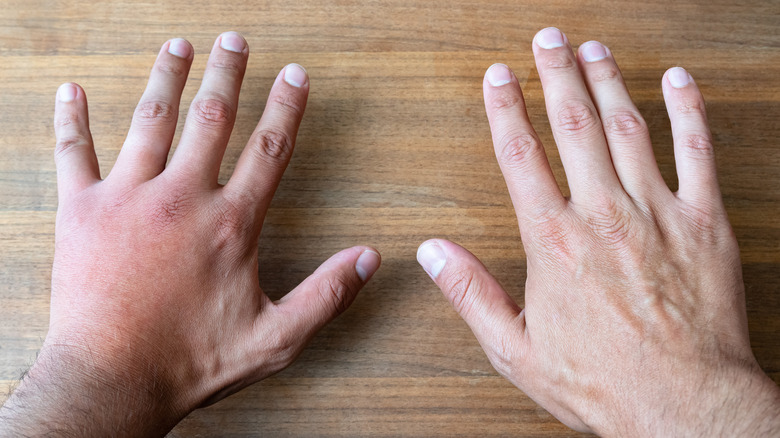What Does It Mean When Your Hands Swell?
You use your hands for many things — driving, eating, typing — so swollen hands could cause some problems in your day-to-day life. Having swollen hands can be uncomfortable and may leave you unable to do certain activities. Healthline notes that the medical term for swelling is "edema," and the most common cause of swelling is from trapped fluid in the tissues of your hands. The reasons for hand swelling can vary from something minor, or it could be a symptom of something more serious.
Medical News Today points out, when it comes to swelling, you may notice your hands and fingers increasing in size and they may even appear puffy or shiny. In addition, if someone presses their finger into your hand, you may notice an indent in the swollen hand that takes time to disappear. So, what could be causing your swollen hands? Here are some potential causes.
Causes of swollen hands
Since swollen hands can be caused by an underlying condition, it's essential to understand the difference between temporary swelling and chronic swelling. Healthgrades notes that swollen hands could be caused by a buildup of fluid or inflammation in the joints in your fingers and hands. Temporary swollen hands that go away quickly could be the result of exercise. Hand swelling that is ongoing can be chronic and could be caused by a broken bone or arthritis. If it's caused by an infection, you may also have a fever, chills, warmth, and redness.
According to Buoy Health, additional causes of hand swelling could be heat, thyroid disease, liver disease, kidney disease, pregnancy, diet, perimenopause, menopause, certain medications, a hand injury, insect bites, warts, cysts, lipoma, cancer, deep vein thrombosis, lymphedema, contact dermatitis, scleroderma, or thoracic outlet syndrome. In children, swollen hands could also signify sickle cell anemia, multisystem inflammatory syndrome, or Kawasaki disease. Seek medical help if you're experiencing swollen hands to determine what is causing it.


